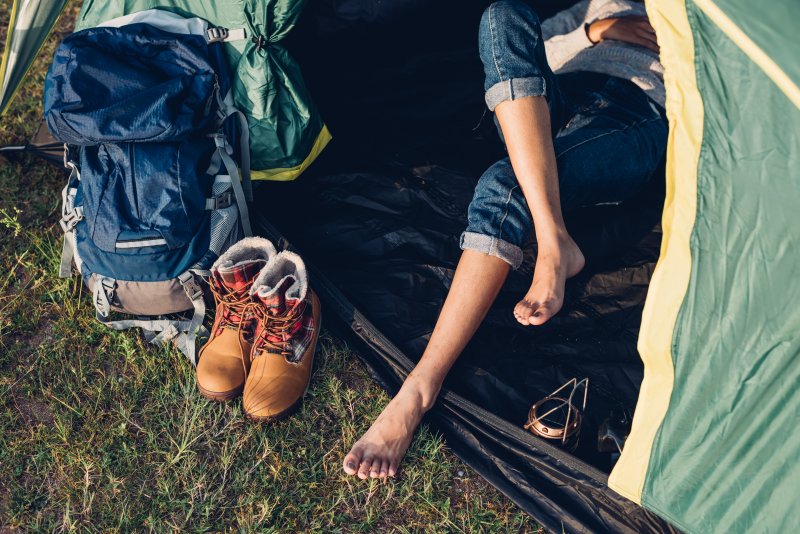
Warmer weather has arrived! With it comes the prospect of spending more time outdoors. While many outdoor enthusiasts simply enjoy feeling close to nature, they may or may not also be aware of the incredible health benefits of camping—including improved sleep.
Exactly how does sleeping outdoors improve sleep quality? The answer is the body’s internal clock, also known as the circadian rhythm.
Your Body’s Internal Clock
The circadian rhythm is what keeps the body’s internal processes optimized throughout the 24-hour cycle of the day. It’s important to note that the circadian rhythm is an effect of our biological clock, which regulates the timing of the body’s processes. So, if the circadian rhythm is out of whack, it means that those essential biological processes are not optimized. This leads to issues like weight gain, impulsive behavior, poor sleep, and fatigue.
Research has also connected the circadian rhythm to the regulation of our blood sugar, cholesterol, mental health, dementia, and even DNA repair.
Circadian Rhythm’s Impact on Sleep
The sleep-wake cycle is an essential part of the circadian rhythm. It tells the body when it’s time to be awake and when it’s time to be asleep.
Light exposure lets our master clock know when people should be more alert, keeping them awake and active. Once it gets dark out, that same clock lets the body know that it needs to start producing melatonin (a sleep-promoting hormone) to tell the brain that it’s time to sleep.
When the sleep-wake cycle is disrupted, a person can experience sleep disorders like insomnia and obstructive sleep apnea, as those alerts aren’t triggering the ways they should be. This disruption also contributes directly to fatigue.
Factors That Can Disrupt the Sleep Cycle
- Traveling, which can lead to jetlag if traveling across time zones.
- Work, particularly early morning and late evening work, can disrupt natural sleep/wake cycles. Shift work disorder, for example, is a sleep disorder caused by a schedule that falls outside the hours of 7 a.m. and 6 p.m.
- Artificial light from computers, cell phones, televisions, and household lighting all of which “tricks” our body into thinking we need to be alert and awake.
- Sleep-wake disorders such as advanced sleep phase disorder, delayed sleep phase disorder, and non-24-hour sleep-wake disorder.
The Outdoors & Sleep
This leads to the health benefits of sleeping outdoors—because of the body’s need to have a well-oiled sleep-wake cycle, operating by the sun and the moon helps reset the master clock back to maximum optimization.
Why? Because artificial light tampers with the brain’s ability to identify when it’s time to wake up and when it’s time to fall asleep. Since modern life is completely saturated with artificial light (cell phones, laptops, overhead lighting), it’s impossible to completely avoid having the sleep-wake cycles disrupted.
Taking into consideration this insight, researchers posed a question: What if a person was to sleep outside for a week or even a weekend? What would happen to their master clock?
After monitoring small groups of participants on weeklong and weekend camping studies, the researchers found that melatonin production began over two and a half hours sooner outdoors than it did in their everyday environments. To lay it out short and sweet: the campers’ body clocks were back in tune. This was true regardless of whether they camped for a week or weekend.
How to Apply This Information
Of course, camping doesn’t solve everything. Once a camping trip ends, modern life restarts. To combat relapsing back into an impaired sleep-wake cycle, researchers from the study made two particularly important recommendations:
- Spend more time outdoors. Go for walks, hike, sit outside—anything to get more natural light.
- Limit your exposure to artificial light. Stay off your phone in the evenings, limit how long you watch television, and open your windows during the day for light versus turning artificial lights on—all of this can contribute to a healthy sleep schedule.
Getting Help for Sleep Apnea
While camping and regulating light exposure can do wonders for rest, if a person is dealing with a serious sleep disorder like sleep apnea, then the only way to overcome it is with professional treatment. If you snore frequently, feel tired no matter how much you sleep, and regularly wake up in the middle of the night gasping or feeling out of breath, then you should schedule a free assessment at Sleep Better Georgia with Dr. Jeff Rodgers. He has been helping people get the rest they need as a sleep medicine practitioner in the Atlanta area for over two decades, and if you’re ready to take control of your problem, you can begin right now by clicking here.
